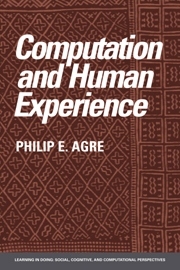Book contents
- Frontmatter
- Contents
- Preface
- 1 Introduction
- 2 Metaphor in practice
- 3 Machinery and dynamics
- 4 Abstraction and implementation
- 5 The digital abstraction
- 6 Dependency maintenance
- 7 Rule system
- 8 Planning and improvisation
- 9 Running arguments
- 10 Experiments with running arguments
- 11 Representation and indexicality
- 12 Deictic representation
- 13 Pengi
- 14 Conclusion
- Notes
- References
- Author index
- Subject index
6 - Dependency maintenance
Published online by Cambridge University Press: 07 December 2009
- Frontmatter
- Contents
- Preface
- 1 Introduction
- 2 Metaphor in practice
- 3 Machinery and dynamics
- 4 Abstraction and implementation
- 5 The digital abstraction
- 6 Dependency maintenance
- 7 Rule system
- 8 Planning and improvisation
- 9 Running arguments
- 10 Experiments with running arguments
- 11 Representation and indexicality
- 12 Deictic representation
- 13 Pengi
- 14 Conclusion
- Notes
- References
- Author index
- Subject index
Summary
Critical technical practice
Having prepared some background, let us now consider a technical exercise. Since readers from different disciplinary backgrounds will bring contrasting expectations to an account of technical work, I will begin by reviewing the critical spirit in which the technical exercises in this book are intended.
Reflexively, the point is not to start over from scratch, throwing out the whole history of technical work and replacing it with new mechanisms and methods. Such a clean break would be impossible. The inherited practices of computational work form a massive network in which each practice tends to reinforce the others. Moreover, a designer who wishes to break with these practices must first become conscious of them, and nobody can expect to become conscious of a whole network of inherited habits and customs without considerable effort and many false starts. A primary goal of critical technical work, then, is to cultivate awareness of the assumptions that lie implicit in inherited technical practices. To this end, it is best to start by applying the most fundamental and familiar technical methods to substantively new ends. Such an effort is bound to encounter a world of difficulties, and the most valuable intellectual work consists in critical reflection upon the reductio ad absurdum of conventional methods. Ideally this reflexive work will make previously unreflected aspects of the practices visible, thus raising the question of what alternatives might be available.
Substantively, the goal is to see what happens in the course of designing a device that interacts with its surroundings. Following the tenets of interactionist methodology, the focus is not on complex new machinery but on the dynamics of a relatively simple architecture's engagement with an environment.
Information
- Type
- Chapter
- Information
- Computation and Human Experience , pp. 105 - 123Publisher: Cambridge University PressPrint publication year: 1997
